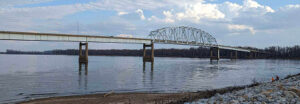FWS’ National Fish Passage Program provides financial and planning assistance for river restoration, nature-based solutions, and flood-resilient infrastructure. This program helps reduce flood risk and supports fish passage by restoring floodplains and wetlands, removing barriers like dams, and upgrading culverts to improve ecological function.
| Supports nature-based solutions | Has a regional or watershed focus | ||
| Does not require matching funds |
Application cycle: By invitation and due by December 31, 2024 for FY2024 funds or September 30, 2025 for FY2025 funds.
Summary: The U.S. Fish and Wildlife Service’s (FWS) National Fish Passage Program (NFPP) offers financial support and technical assistance to restore rivers and protect aquatic species by removing or bypassing barriers like dams and culverts. The program prioritizes large-scale ecosystem restoration and floodplain restoration, while also funding artificial passage structures (e.g., fishways, fish ladders), making it a strong fit for local communities and state resilience leaders looking to improve regional flood resilience.
NHPP is funded through annual appropriations and the Bipartisan Infrastructure Law, and promotes nature-based solutions that create flood-resilient infrastructure. NFPP projects focus on restoring native species, improving fish passage, and addressing regional habitat needs while boosting community resilience against flooding and other natural hazards, promoting public safety, creating jobs, modernizing transportation infrastructure, and enhancing recreational opportunities.
Eligible applicants: City, township, special district, county, or state governments; nonprofit and for-profit organizations; small businesses; independent school districts; public and state controlled institutions of higher education; private institutions of higher education; public housing and Indian housing authorities; Native American tribal organizations; Native American tribal governments; individuals.
Eligible activities: The NFPP can support flood resilience projects that enhance aquatic connectivity and improve fish passage by removing barriers in waterways and reconnecting floodplains. NFPP funding can be used for:
- Project planning and management: Funding can support project planning, feasibility studies, engineering and design work, permitting, on-the-ground restoration efforts for fish passage, near-term implementation monitoring, community outreach, and capacity to manage these activities effectively.
- Infrastructure modernization: Activities that improve aquatic connectivity and fish passage also contribute to modernizing essential infrastructure — including road culverts, bridges, and water diversions — enhancing community resilience to flooding and other natural hazards.
- Habitat restoration: This includes wetland and floodplain restoration, dam removal, culvert replacement, floodplain reconnection, dike breaches, and reconnection of tidal habitats.
- Filter — Watershed or regional focus: This program specifically focuses on ecosystem-wide restoration and floodplain restoration.
Funding: $250,000 – $10,000,000. FWS expects to provide 40 awards of $1 million each per fiscal year. Total available annual funding includes about $18 million in annual appropriations and about $35 million from the Bipartisan Infrastructure Law.
Cost share: Cost sharing is encouraged but not required, although FWS strives to achieve a cost-share ratio of 50% federal / 50% nonfederal.
- The ability to provide nonfederal cost share contributes up to 5% of the score on an applicant’s proposal.
- Nonfederal cost share contributions may consist of cash or in-kind services.
Application process:
- To apply, applicants should contact their NFPP Regional Coordinator to discuss their potential project. If the project meets NFPP eligibility, the applicant can prepare and email a Letter of Interest to their NFPP Regional Coordinator. Select applicants will proceed to work with FWS staff to develop a proposal that meets NFPP requirements.
- Full applications are by invitation only and due by December 31, 2024 for FY2024 funds or September 30, 2025 for FY2025 funds.
- Applicants can request reimbursement for project costs incurred up to 90 days before the award start date. These costs will be discussed during pre-award negotiations with FWS. However, this is not a guarantee, and any costs incurred before receiving a Notice of Award are the applicant’s responsibility.
- To learn more about the NFPP, visit FWS’ website or the Notice of Funding Opportunity on grants.gov.
| Project spotlight — Dam removal and habitat restoration in Androscoggin, Maine:
Androscoggin received $350,000 from NFPP for habitat restoration, resilience, and risk mitigation at the Sabattus River. The project will remove the Upper Town Dam and Remnant Mill Dam from Maine’s Sabattus River, a tributary of the Androscoggin River, while restoring and stabilizing the riverbanks. This effort will improve public safety, reduce flooding risks, restore parks and natural access for disadvantaged communities, and reopen critical spawning habitats for endangered Atlantic salmon, river herring, and other species in the Androscoggin watershed. |


